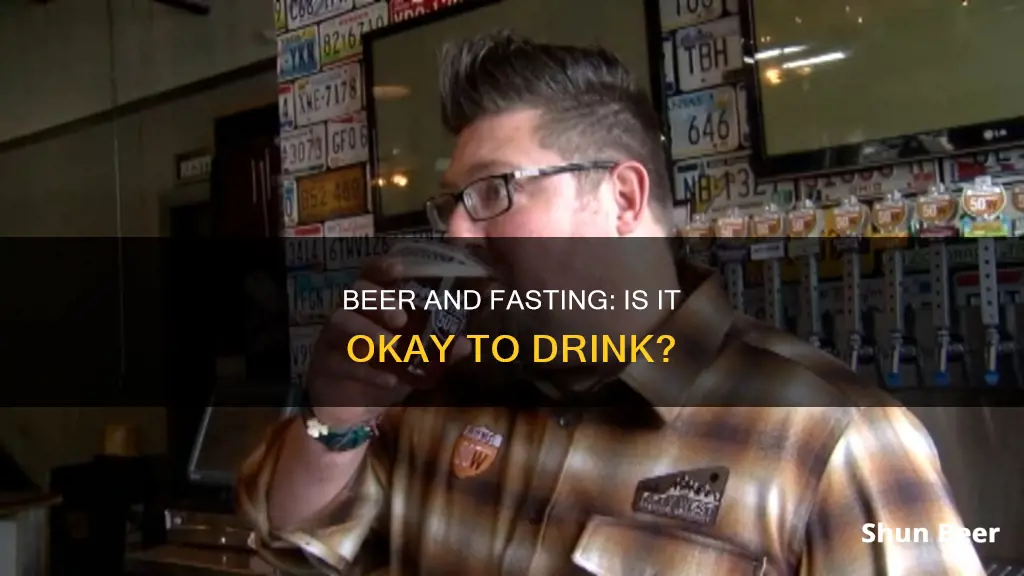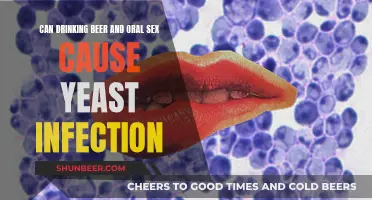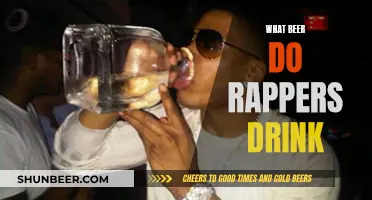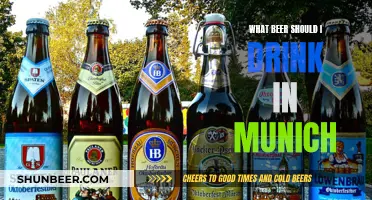
Intermittent fasting has become a popular health trend in recent years, with people adopting it for various reasons, including weight loss, improved mental clarity, and increased longevity. While this dietary pattern doesn't restrict any foods during the eating periods, people often wonder if they can consume alcohol during their fasts. So, can you drink beer while intermittent fasting?
| Characteristics | Values |
|---|---|
| Drinking alcohol during fasting | Not recommended; breaks the fast |
| Drinking alcohol during eating window | Acceptable in moderation |
| Alcohol's effect on weight gain | Excessive drinking may increase body fat percentage |
| Alcohol's effect on inflammation | Excessive drinking may cause chronic inflammation |
| Alcohol's effect on cellular repair | May prevent cellular repair |
| Best alcohol choices | Dry wine and hard spirits |
What You'll Learn

Drinking beer during a fasting period will break your fast
When you are fasting, your body prioritises metabolising alcohol over other macronutrients like carbohydrates, fat, and protein. This is because alcohol is toxic and cannot be stored in the body. The liver is responsible for breaking down most of the alcohol consumed. The liver metabolises alcohol through two main enzymes: alcohol dehydrogenase (ADH) and aldehyde dehydrogenase (ALDH). ADH converts alcohol into acetaldehyde, a toxic substance that is then broken down by ALDH into acetate, a less harmful substance. This process can cause dehydration, especially during fasting periods when you may already be consuming less water than usual.
Drinking alcohol during a fast can also disrupt your sleep patterns, leading to poor sleep quality and reduced recovery during fasting periods. Adequate sleep is essential for maintaining overall health and optimising the benefits of fasting. Additionally, alcohol can stimulate your appetite and lead to increased hunger, making it more challenging to stick to your fasting goals.
If you are intermittent fasting and want to drink alcohol, it is recommended that you do so during your designated eating window. For example, if you are following the 16:8 method and fast from 7 pm to 11 am, it is fine to have a beer with dinner at 5 pm the next day. It is also important to drink in moderation, with recommendations varying from no more than one or two drinks per day for women and no more than two drinks per day for men.
Beer and Bowel Movements: Constipation Concerns?
You may want to see also

Beer is calorie-dense, with 153 calories per average beer
Beer is a calorie-dense drink, with the average beer containing around 153 calories. Alcohol, in general, is calorie-dense, with 7 calories per gram. This is more calorie-dense than carbohydrates and proteins, which have 4 calories per gram. Whiskey, for example, has around 64 calories per ounce (28 grams).
The high-calorie content of beer and other alcoholic drinks means that they can massively add to the total calories consumed during your eating window if you are intermittent fasting. This can be detrimental to your fasting goals, especially if weight loss is your objective. For instance, alcohol consumption can lead to impaired decision-making and increased hunger, potentially resulting in overeating and negating the benefits of fasting.
Additionally, alcohol can stimulate appetite and lead to increased hunger, making it more challenging to stick to your fasting goals. This is particularly relevant if you are fasting for weight loss, as drinking alcohol may lead to overeating and craving less nutrient-dense foods.
If you are intermittent fasting and want to include alcohol in your diet, it is recommended to prioritise low-calorie alcoholic drinks such as light beer, dry wine, and hard spirits mixed with zero- to low-calorie mixers.
Beer and Milk: A Dangerous Mix?
You may want to see also

Alcohol can impede fat burning
Drinking alcohol during a fast is generally not recommended as it can break your fast and impede fat burning. However, if you choose to include alcohol in your fasting routine, it is crucial to do so safely and in moderation.
Alcohol is a macronutrient that provides 7 calories per gram, making it more calorie-dense than carbohydrates and proteins. When consumed, alcohol is rapidly absorbed by the stomach and small intestine, then metabolized by the liver. This process takes priority over fat oxidation, which may hinder weight loss goals. Additionally, alcohol can stimulate appetite and lead to overeating, further impeding fat burning.
A study in 19 adults found that ingesting an alcohol-rich meal significantly reduced levels of fat breakdown compared to a meal rich in protein, fat, and carbs. Observational studies have also linked excessive alcohol consumption with increased levels of body fat. While light to moderate drinking does not show the same effects, excessive drinking may increase your body fat percentage.
To minimize the impact of alcohol on your fast, it is recommended to consume it during your designated eating window rather than during fasting periods. It is also important to stay hydrated, as alcohol is a diuretic and can lead to dehydration.
In summary, alcohol can impede fat burning due to its calorie content and metabolic priority. If you choose to consume alcohol while fasting, moderation is key, and it is best to do so during your eating window.
Understanding Beer Siphons: How Do They Work?
You may want to see also

Drinking on an empty stomach is never a good idea
Drinking on an empty stomach increases the rate at which alcohol travels throughout the body. This means that you will reach a potentially unsafe level of alcohol in your system more quickly. The longer alcohol stays in the stomach, the slower it is absorbed and the slower it affects the body. Food prevents alcohol from passing quickly into the small intestine.
Drinking on an empty stomach can also increase your risk of a hangover. Hangovers usually happen the day after drinking large quantities of alcohol. Symptoms may include dizziness, inability to concentrate or think clearly, mood issues such as depression, anxiety and irritability, and sensitivity to light and sound.
If you are following an intermittent fasting regime, you can drink alcohol during your eating window. However, alcohol is calorie-dense and may slow fat burning. Excess drinking may promote chronic inflammation and other health issues. Alcohol can also trigger inflammation and increase your risk of some diseases.
Chugging 24 Beers Daily: A Deadly Affair
You may want to see also

Drinking alcohol during fasting can cause dehydration
Drinking alcohol during a fast is generally not recommended as it can break your fast and hinder your fasting goals. However, if you choose to include alcohol in your fasting routine, it is crucial to do so safely and responsibly. Here's why drinking alcohol during fasting can cause dehydration:
Dehydration
Alcohol is a diuretic, which means it increases urine production and can lead to dehydration. This is especially concerning during fasting periods when you may already be consuming less water than usual. Dehydration can have negative effects on your body, including headaches, fatigue, and reduced physical and mental performance. It is important to prioritize hydration during fasting, and drinking alcohol can work against this goal.
Calorie Intake and Weight Loss
Alcohol is calorie-dense, providing 7 calories per gram, which is more than carbohydrates and proteins. When consumed during a fast, these calories can add up and break your fast. Additionally, alcohol can stimulate appetite and lead to overeating, making it more challenging to stick to your fasting goals, especially if weight loss is your objective.
Impaired Decision-Making
Alcohol can lower your inhibitions and impair your decision-making abilities. This may lead to poor food choices and increased difficulty in adhering to your fasting plan. The combination of alcohol and fasting can make it harder to resist cravings and stick to your intended eating and drinking schedule.
Sleep Disruption
Consuming alcohol during fasting can disrupt your sleep patterns, leading to poor sleep quality and reduced recovery during fasting periods. Adequate sleep is essential for maintaining overall health and optimizing the benefits of fasting. Drinking close to bedtime can impact your body's ability to enter deep, REM sleep, which is crucial for restorative rest.
Health Risks
Excessive alcohol consumption during fasting periods can have long-term health effects, including impaired liver function and increased risk of developing type 2 diabetes. Alcohol can cause inflammation and damage to the liver, impairing its ability to metabolize substances effectively. Additionally, alcohol can negatively impact insulin sensitivity, which is a primary benefit of fasting for blood sugar control.
In conclusion, while moderate alcohol consumption during your eating window may not significantly affect your fasting goals, excessive drinking can lead to dehydration, weight gain, and increased health risks. It is important to prioritize hydration, moderate your alcohol intake, and be mindful of the potential negative consequences on your health and fasting progress.
Old Beer: Is It Safe to Drink After Four Years?
You may want to see also
Frequently asked questions
Drinking beer during a fast will break your fast as it contains calories. However, drinking beer in moderation during your eating window is fine and won't negatively impact your fasting state.
Drinking beer in moderation may not affect your fasting goals, but drinking often or in excess can counteract the benefits of intermittent fasting and negatively impact your health.
Drinking beer during a fast is unhealthy and unsafe as you have no food in your system. Alcohol can also disrupt your sleep patterns, increase dehydration, and affect your liver function.
Lower-calorie alcoholic drinks are best to have during your eating window. This includes light beer, dry wine, and hard spirits like vodka, gin, or tequila mixed with sparkling water.
If you're fasting for weight loss, it's best to limit your alcohol intake as it may lead to overeating and increased hunger. Alcohol can also stimulate appetite and lead to increased hunger, making it harder to stick to your fasting goals.







